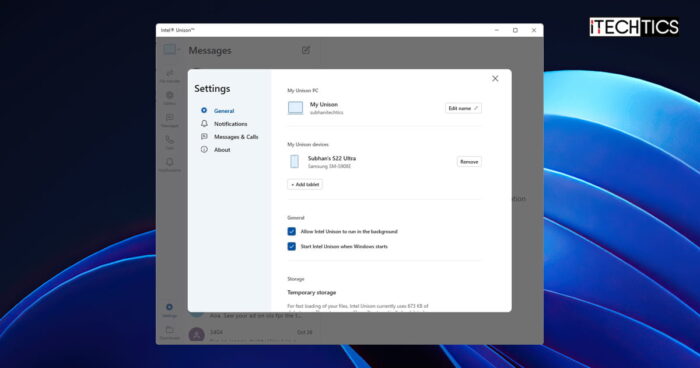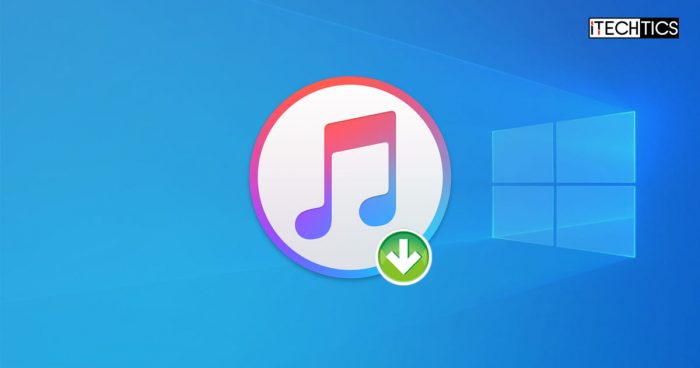VirtualBox is a cross-platform hypervisor that you can use to run other operating systems on. When Microsoft made Windows 11 requirements mandatory, it became impossible to create a Windows 11 Virtual machine (VM) on VirtualBox, as it did not have the needed support for the OS.
However, Oracle has now finally published VirtualBox 7 with support for Windows 11, so you no longer have to struggle with the hardware requirements. It now comes with Virtual Trusted Platform Module (vTPM), Secure Boot, and VM encryption capabilities.
Download VirtualBox 7 for different platforms using the direct download links given below.
Learn how to create a Windows 11 VM on VirtualBox.
Download VirtualBox 7
Click on the respective link below to download Oracle VirtualBox 7 for your respective operating system:
Download VirtualBox 7 for Windows
Download VirtualBox 7 for macOS
Download VirtualBox 7 for Fedore 36
For more downloads, visit Oracle’s VirtualBox 7 download page.
Install VirtualBox 7 on Windows
Follow the given steps below to install VirtualBox on a Windows PC:
-
Begin by downloading the VirtualBox 7 setup from the links above and then run the downloaded .EXE file.
-
The installation wizard will now run. Click Next on the welcome screen.

Proceed -
Now leave the default settings and click Next again.
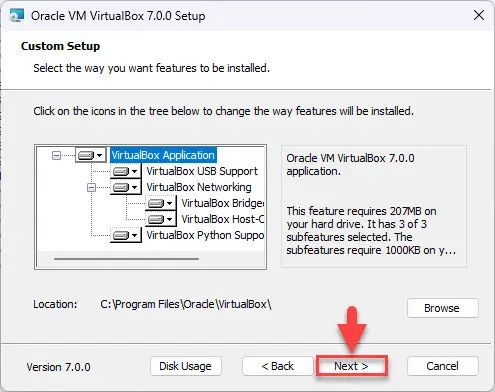
Leave default settings -
When asked to install the networking feature, click Yes.

Install networking features -
When asked to install the missing dependencies, click Yes.
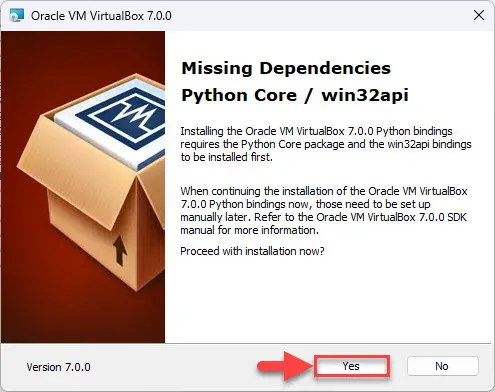
Install missing dependencies -
Now click Install to begin the process.

Begin installation -
Oracle VirtualBox will now begin installing. When it completes, click Finish.

That is it! You will now have VirtualBox installed on your Windows computer that you can use to run more operating systems on top of your current Windows OS.
What’s new in VirtualBox 7
VirtualBox 7 includes some new features and several fixes. Below you’ll find the complete changelog for VirtualBox 7:
-
New Features
- Virtual machines can be fully encrypted now, including the VM config logs and saved states.
- Oracle Cloud Infrastructure (OCI):
- Cloud VMs can be added to Virtual Machine Manager and controlled as local VMs.
- Cloud networks can now be configured via the Network Manager tool the same way as it is done for Host-only and NAT networks.
- Graphical User Interface (GUI):
- Added a new utility similar to “top” or “resource monitor” which lists performance statistics (CPU usage, RAM usage, disk I/O rate, etc.) of running guests.
- Reworked the new VM wizard to integrate the unattended guest OS installation and to have a more streamlined workflow.
- Added a new help viewer widget that enables the user manual to be navigated and searched.
- Added a new notification center unifying most of the running progress and error reporting around the GUI.
- Improved theme support on all platforms. Linux and macOS use native engines while for Windows host it is separately implemented.
- The icon size has been updated.
- Audio:
- Vorbis is now the default audio format for WebM containers for audio recordings. Opus is no longer being used.
- Added “default” host driver type to make it possible to move VMs (appliances) between different platforms without the need of changing the audio driver explicitly. When the “default” driver is selected, the best audio backend option for a platform will be used. This is the default for newly created VMs.
- Guest Control:
- Implemented initial support for automatic updating of Guest Additions for Linux guests.
- Implemented the ability to wait for and/or reboot the guest when updating Guest Additions via VBoxManage.
- VBoxManage:
- Added Guest Control “waitrunlevel” sub-command to make it possible to wait for a guest to reach a certain run level.
- Windows Host:
- Added experimental support of running autostarted VMs in session 0, to allow running VMS even when a user is not being logged in .
- MacOS Host:
- All kernel extensions have been dropped. VirtualBox now relies fully on the hypervisor and vmnet frameworks provided by Apple. At the moment the implementation lacks an “Internal Networking” functionality which will be provided at a later date.
- Provided a Developer Preview package for systems with an Apple silicon CPU. This is an unsupported work in progress and is known to have very modest performance.
- Linux Guest Additions:
- Reworked guest screen re-size functionality and added basic integration with some of guest Desktop Environments.
- Devices:
- Implemented new 3D support based on DirectX 11 (and DXVK on non-Windows hosts).
- Added virtual IOMMU devices (Intel and AMD variant).
- Added virtual TPM 1.2 and 2.0 devices.
- The EHCI and XHCI USB controller devices are now part of the open-source base package.
- EFI:
- Added support for Secure Boot.
- Debugging:
- Added experimental support for guest debugging through GDB and highly experimental support for guest debugging through KD/WinDbg.
-
Fixes and Additions
- Oracle Cloud Infrastructure (OCI):
- Cloud networking functionality is enhanced for local VMs. Now the local VMs can be connected to cloud networking.
- Graphical User Interface (GUI):
- Improved behavior of the VM list and various VM-related tools in case multiple items are selected.
- On available platforms, added a new option to disable the host’s screensaver.
- Reworked global preferences, machine settings, and wizards to improve stability and usability.
- Improved mouse handling in multi-monitor cases on the X11 platform.
- The medium enumeration engine was reworked to improve performance.
- NAT Network stuff was moved from global preferences to the global Network Manager tool.
- Extension Pack Manager was moved from global preferences to global tools.
- Improved the overall accessibility.
- Migrating to recent Qt versions.
- Oracle Cloud Infrastructure (OCI):
With the help of these added features and support, you should now be able to create a Windows 11 VM using VirtualBox.
Uninstall VirtualBox
If in the future you wish to remove VirtualBox from your PC, here is how:
-
Open the Programs & Features applet by typing in appwiz.cpl in the Run Command box.
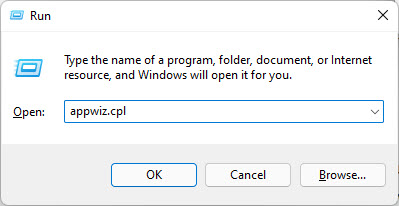
Open Programs and Features applet -
Here, right-click on “Oracle VM VirtualBox XX,” where “XX” is the version of the software, and then click Uninstall from the context menu.

Uninstall VirtualBox If asked for confirmation, click Yes.
-
VirtualBox will now begin the removal process and you will see a progress window. When uninstalled successfully, the window will automatically disappear. At this point, we suggest that you optionally restart your computer for things to run smoothly.
Closing Words
Like Hyper-V and VMware, VirtualBox is a great hypervisor to test your operating systems and other software on. However, it had lost its popularity in the Windows world because it has been more than a year since Windows 11 was released, and now Oracle has published an update for its hypervisor with support for the said OS.
Anyways, for those who had their hands set on VirtualBox, it is now time to return.



